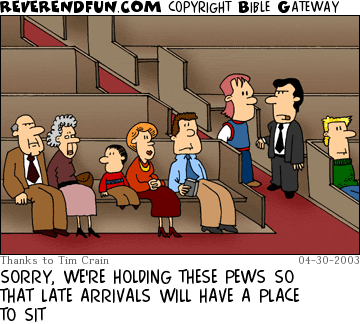AIM FOR CHANGE
BY THE END OF THE LESSON, WE WILL:
INVESTIGATE the divisions within the Corinthian community; IDENTIFY hurts that can be caused by divisions within a faith community; and EXPLORE methods of achieving unity within the body of Christ.
FOCAL VERSES: 1 CORINTHIANS 1:10-17
KEEP IN MIND
"Now I beseech you, brethren, by the name of our Lord Jesus Christ, that ye all speak the same thing, and that there be no divisions among you; but that ye be perfectly joined together in the same mind and in the same judgment" (1 Corinthians 1:10).
 AT-A-GLANCE
AT-A-GLANCE
1. Unity is Essential (1 Corinthians 1:10-11)
2. Let Jesus be the Focus (vv. 12-17)
IN FOCUS STORY
Tina dreaded going to the next meeting of the planning committee for the church's anniversary celebration. This was their first anniversary since the founding pastor retired and their new pastor was installed. At first it was fun, but slowly the meetings became more and more uncomfortable. The members were divided. Some of them wanted to maintain the anniversary traditions that the founding pastor started. Other believed that the installation of the new pastor created an opportunity for new traditions to be established.
Planning began to take a back seat to arguing, and the meetings became more and more stressful. Hard feelings and frustration started to create tension that could be felt during worship services and Bible study. Tina wondered how anyone could see God's glory in all of this chaos.
It is important that we encourage one another, not allowing disagreements to hinder our fellowship or to distract us from the work that we are called to do for Jesus. This lesson discusses the importance of unity in the body of Christ.
THE PEOPLE, PLACES, and TIMES
Apostle Paul. A well-educated Jewish scholar and Roman citizen, as well as a skilled tent maker. This extensive knowledge allowed him to be able to identify with and talk to a wide range of people. Paul was a devout Jew who passionately sought to stop this new Jesus movement until he was converted on the road to Damascus. After that, Paul began to spread the Gospel throughout the Roman Empire. He developed small, close-knit Christians groups in different cities. These small groups were linked together to form a large movement.
Corinth. Known for its beauty, diversity, and culture, Corinth was a favored port city during Paul's time. Located on the narrow isthmus that connected the Peloponnese to mainland Greece, it was a center for trade and an administration site for the Roman Empire. Corinth was also know for its relaxed morals and numerous pagan temples. Paul ministered in Corinth for eighteen months during his second missionary journey. During that time, he preached the Gospel and organized new coverts into small congregations that usually met in households.
BACKGROUND
Our Keep in Mind verse, 1 Corinthians 1:10, plays a key role in Paul's letter to the Corinthians church. In order to really appreciate how important this verse is, we need to take a closer look at the structure of the letter. In ancient times, letters were the primary means of communication between people who were far away form each other. Like modern letters, ancient letters were usually addressed to a person, family, or small group and were intended to be read privately.
Paul's letter, however, was written to a large group and intended to be read out loud. With that said, his letter needed to follow the same rhetorical guidelines that were used for public speeches. Speeches and letters are used to persuade and audiences on a particular point of view. In modern times, this style of persuasion is most often seen in courts and used by lawyers.
One fundamental element in this style of writing is know in Latin as the propositio. The propositio serves as the foundation or thesis for Paul's entire letter. Every theme that Paul discusses in 1 Corthinians points back to this verse. Paul passionately appealed to the church to understand that power, prestige, and even spiritual gifts should never take precedence over unity. With this statement, Paul reminded that Corinthians that most valuable gifts they had were one another and the love that united them as one body in Jesus Christ.
SEARCH THE SCRIPTURES
1. What are some of the others places in the book of 1 Corinthians where Paul discusses unity?
2. Who notified Paul that there was bickering going on in the church (1 Corinthians 1:11)?
3. Why does Paul say that contentions should not exist in the church (v. 13)?
DISCUSS THE MEANING
1. Why is unity in the church important? How far should we go to maintain it?
2. How do unity and love work together?
3. What advice can you give to Tina and the committee in the In Focus story? Support your response with Bible references.
LESSON IN OUR SOCIETY
In our society, we are inundated with messages that encourage prideful behavior. We are told that the only things that are important are what we think, what we want, and how we feel. Society would have us to believe that the relentless pursuit of these things will lead to happiness and fulfillment. But God instructs believers to choose a different path. What can you do as an Apostolic believer to set a different example for those you encounter in the workplace or community? How are your actions setting an example for unity and peace?
MAKE IT HAPPEN
 Have you ever had a disagreement with another person that has gone unresolved? A simple difference of opinion can damage a relationship to a point that seems irreparable. Jesus gave us two essential commandments: love God completely and love each other (Matthew 22:37-39). Apply strategies from today's class to repair the breach you face. Let them prompt you to find new ways to overlook differences, work together, and appreciate, accept, and love others.
Have you ever had a disagreement with another person that has gone unresolved? A simple difference of opinion can damage a relationship to a point that seems irreparable. Jesus gave us two essential commandments: love God completely and love each other (Matthew 22:37-39). Apply strategies from today's class to repair the breach you face. Let them prompt you to find new ways to overlook differences, work together, and appreciate, accept, and love others.
(Except from Apostolic Light Pentecostal Assemblies of the World Inc.)














.jpg)


































